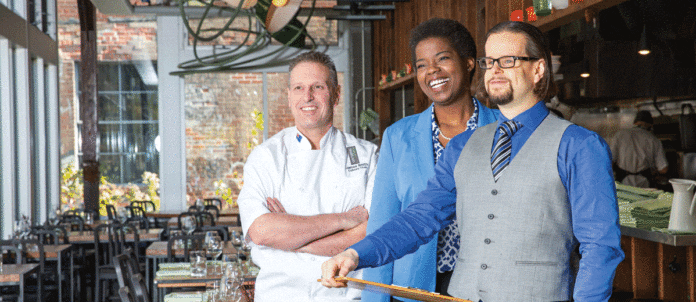Volume 47, Number 10
[dropcap size=big]T[/dropcap]hough he grew up in a dairy-farming and cheese-making community in rural Australia, James Smith had little zest for food outside his mainstay meat and potatoes. But after he travelled to Toronto at age 20, and tasted Vietnamese fish pho in the city’s vibrant Kensington Market, the chair of Culinary Programs and Operations at Toronto’s Centennial College fell in love with the idea of food. The exotic flavours and ingredients, opened up a new world to him and kick-started his 25-year journey as a chef, educator and school administrator.
In November, Smith joined a new but seasoned team of industry aces that is guiding Centennial College into its next renaissance. “I want to be a part of creating great programs in and around culinary that will get students a good job in the community but also a job that’s keeping up with the times,” he says. In his newly created role, Smith will focus on the academic leadership of the culinary and baking programs, the academic operations of a new Culinary Arts Centre (see “Building Blocks,” p. 34) and oversee the transition into the expanded facility in 2016.
Centennial’s hospitality programs have previously been a relatively small part of the college, but industry demand for more robust education and more graduates with culinary skills led to additional programming and investments in new cooking and bake labs approximately two years ago. The results were tremendous and have spurred further initiatives under the leadership of Joe Baker, dean at the School of Hospitality, Tourism & Culinary Arts, who assumed his role in May. “Now that we’re into that culinary world, we have aspirations to do new program development and really expand as we get a bigger facility,” he says. “My mandate is to make sure industry recognizes Centennial as a leader to recruit and to hire workers, that we’re giving educational opportunities to students locally and internationally and that we’re preparing the workforce of the future.”
Of course, Baker cannot entirely understand what the industry is going to look like in the future, but he knows what’s important. “A workforce that looks at things from a different perspective is going to be essential,” he says. “Innovation and entrepreneurialism are becoming the new essential skills, almost as important as customer service and food handling, so it’s focusing on those skills and making sure they are embedded in our curriculum.”
Before joining academia more than eight years ago, Baker worked extensively in the restaurant business at establishments such as Richmond, B.C.-based The Keg Steakhouse and Bar, and Toronto-based Oliver & Bonacini Restaurants; he has assembled a like-minded leadership team. Michelle Caine also brings insider know-how to her role, having worked in various hospitality and management capacities at restaurant companies, including Oakville, Ont.-based Tim Hortons and Toronto-based Krispy Kreme Doughnuts, before switching to education. The chair of Centennial’s School of Hospitality & Tourism is bringing relevancy, connections within the industry and more guest speakers to the curriculum to ensure her students land great placements and ultimately great careers upon graduation. “Colleges are about getting people jobs and careers and being very hands on,” she says.
Caine leads by example, seizing any opportunity to get involved in the community. She’ll encourage her students to participate in industry events, conferences and awards shows as the programs evolve. She’s fostering connections with high schools to promote Centennial as a great place for hospitality training, and she’s working with local MPPs to develop community breakfast programs. In July, celebrity chef Rob Rainford joined the school as culinary ambassador to share his insights and do cooking demonstrations at high schools and community events. And, in September, 14 industry pros were welcomed to the team to teach in the classrooms, giving students crucial interaction with the trade.
Smith, too, values his professional network and believes it’s essential to gain input from other chefs, food manufacturers and even grocery store chains to develop programs and courses for his students.“[Collaboration prepares] students to go out, be relevant and be trained to do what the industry needs,” he says.
In addition to its theory-based classes, the Culinary Arts program will include more multiple learning platforms through the new Culinary Arts Centre. Students will operate an expanded 70-seat casual-style restaurant and a café, featuring breads and pastries (prepared in the baking labs), sandwiches, salads and gourmet coffee. “These operations were designed with an academic perspective in mind,” Baker says. “Experiential learning is a hallmark of what we do at Centennial and is a differentiating factor.”
A conference centre on the eighth floor of the new facility — which will include small meeting rooms, open event spaces and a private dining room — will provide opportunities to cultivate skills at special events. A catering kitchen and four hotel suites will service those operations as well. In addition, a quick-service, off-campus restaurant will enhance experiential learning opportunities while maintaining the safety net of a classroom setting. “You’ve got to get students on the ground, in the trenches so to speak and do it while it’s still a safe learning environment,” explains Smith.
Coming in at the grass-roots level is what Smith looks forward to most. “Vision-wise and philosophy-wise, this new position is really where I see myself having the biggest impact with students and the creation of new programming,” he says.


















